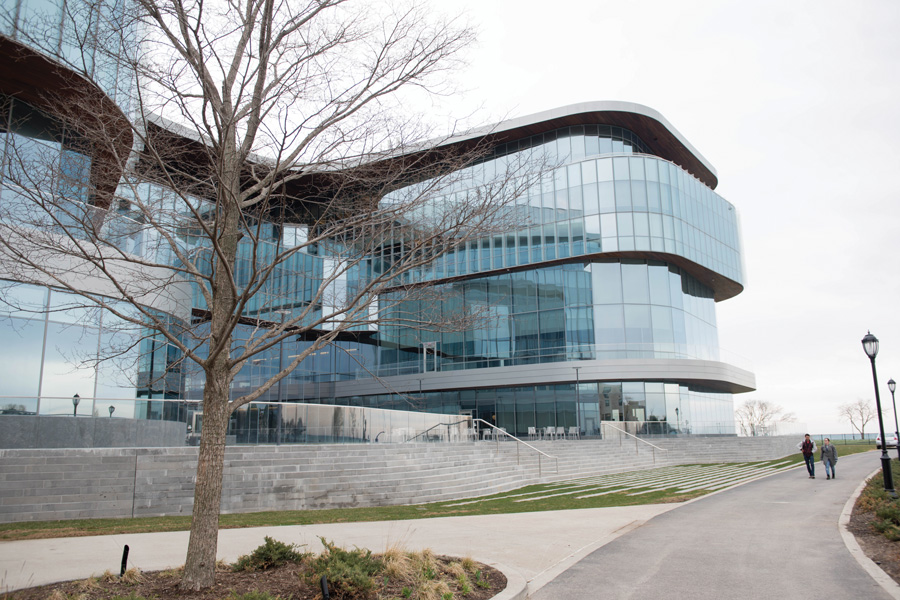Students create solutions for challenges of living with disabilities
Kellogg School of Management’s Global Hub on Northwestern’s campus. Students participated in a TOM:Northwestern University Makeathon at the Hub over the weekend, where they created solutions to everyday problems faced by people with disabilities.
April 30, 2017
Chicago resident Darcy Denner said she loves exploring, but her adventurous spirit is affected by a significant visual impairment. She is one of five people with disabilities who could have their lives improved as a result of technology created by Northwestern students.
More than 30 students from NU and other Chicago-area universities gathered at the Kellogg School of Management’s Global Hub from Friday to Sunday to participate in Makeathon. The event was co-hosted by Northwestern and TOM:Tikkun Olam Makers, an organization founded in Israel.
The event pairs “Need Knowers” — people with disabilities — with “Makers,” who design a solution to a daily problem the Need Knower faces, said TOM:Northwestern University co-chair Guy Zeltser, a second-year Kellogg student.
TOM was founded in 2014 by the Reut Group, a strategy group based in Tel Aviv, Israel, focusing on challenges in society and trying to introduce new solutions for those challenges, said TOM architect of inspiration Rebecca Fuhrman.
When the group organized the first Makeathon, it was meant to be a one-time event, Fuhrman said. However, the event’s success prompted the arrangement of future Makeathons in locations spanning multiple continents.
“Tikkun olam is Hebrew for ‘repair the world’,” Fuhrman said. “The idea is repairing the world with the Maker community.”
The Makers who participated in TOM:NU were mostly from the McCormick School of Engineering, but some were graduate students from NU and other universities, Zeltser said. The Need Knowers ranged in age from infants to adults, he said.
Denner, who was selected to be a Need Knower, started losing her vision when she was 3 years old. She is now legally blind in one eye and fully blind in the other. Members of Denner’s team designed software with GPS technology that will tell her where she is, such as which intersection she is approaching.
“I’m excited to see how it implements into my everyday life, especially being in areas that I’m not necessarily familiar with,” Denner said. “I’m somewhat adventurous and like to kind of go to places that I’ve never been before, so I think it’ll be really cool to use in the future.”
Makers also developed technology to help other people with a variety of disabilities, ranging from missing fingers to cerebral palsy.
Although a winning team was set to be chosen at the event’s closing ceremony on Sunday, Zeltser said judges could not decide on a winner, so they awarded each Maker a prize of either a $250 Amazon gift card, a $250 OpenTable gift card or a helicopter ride above Chicago.
In addition to prizes, each team received a recognition for their creation. Recognitions included “Most Innovative,” “Most Cost Effective,” “Best Design,” “Most Flexible” and “Most Achievable,” said TOM:NU co-chair Gal Ben Dor, a second-year Kellogg student.
During the event, teams worked on their solutions, while some Need Knowers observed and tested the prototypes. Denner told The Daily on Saturday that participating in the event gave her the opportunity to meet new people and work with her team.
“I have actually been looking for groups that specifically target people with disabilities and (help) them with their challenges, so (it) seemed fun,” she said.
The event introduced Need Knowers to students and brought together students from different universities and fields, Zeltser said.
First-year Kellogg student Aanchal Taneja said she works in the health care industry and had never used a power tool before the Makeathon. Taneja was a member of the team that designed a way for Victoria Morris –– who has multiple sclerosis –– to get up and into a wheelchair without the assistance of a caregiver. Still, Taneja said she felt able to contribute to the group.
“I would like to say that our team is pretty efficient and effective,” Taneja said. “We are all working together in terms of finding different ways to make this design that we have for her, as customizable to her needs, as stable and strong as we want it to be.”
Zeltser said he hopes the event helps students realize they can make a direct impact on somebody’s life.
In addition to seeing tangible results from their work, Zeltser said it is important Makers continue working toward solutions to everyday challenges after the Makeathon is over.
“I want them not to just say, ‘Okay, I did something nice or something good for the world,’” Zeltser said. “I want them to know that it is … my personal expectation that they will go out, spread the word and try to do more things like that. It can’t be the only thing that we are doing.”
Email: [email protected]
Twitter: @_janeyun


